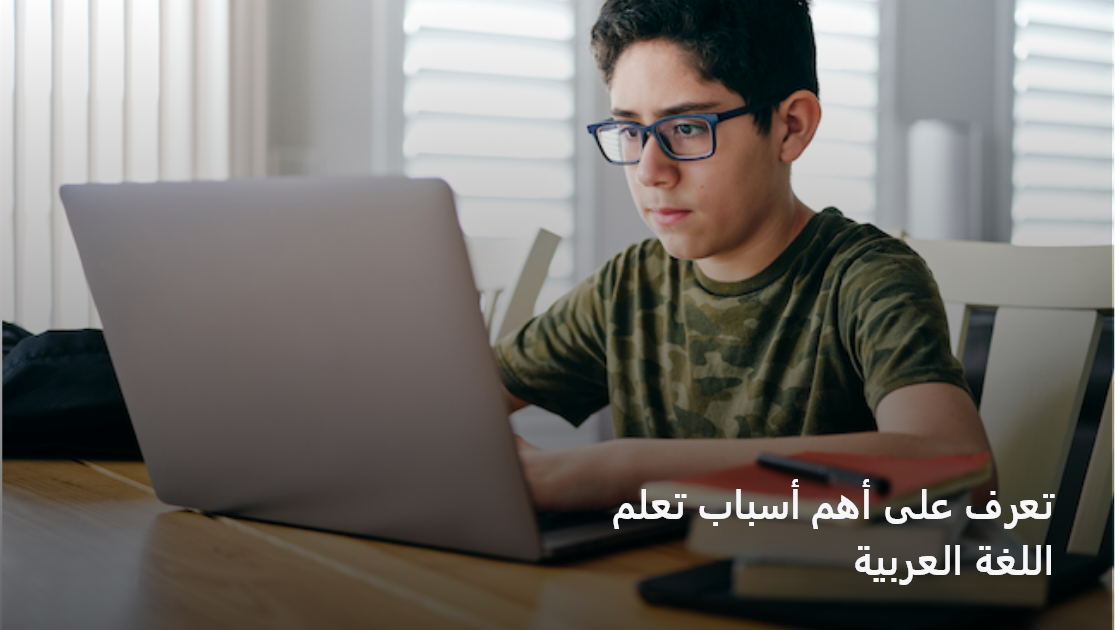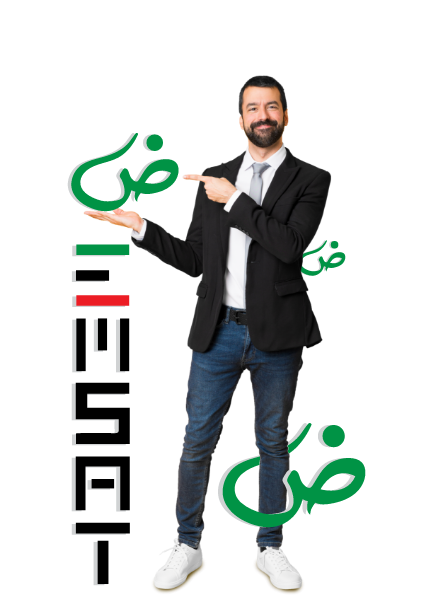

Although most ancient scholars and researchers agree on the antiquity of the Arabic language and the depth of its origins in previous civilizations, its origins remain a matter of dispute among many of them, due to the lack of a fixed date on the origin of how it originated or the original source from which it sprang.
While some linguists trace the origin of the Arabic language back to the natural development of ancient languages over time, others, such as Ibn Taymiyyah, believe that the Arabic language was created through inspiration, was taught to humans, and then was passed down from one individual to another until it became a means of communication between people.
Some scholars have also confirmed that the origin of the Arabic language is an innate matter that was circulated among the ancients, and then gradually developed until it reached the expression of what is going on in the souls and around them with these sounds that we call today the sounds of the Arabic language.
Reasons to learn Arabic
The Arabic language differs in its structure and branches from the language we speak today. While many Arabs consider that what they use to communicate is the Arabic language, many are also shocked when they learn that the Arabic language is completely different from the language we use today to communicate, especially in terms of grammatical rules.
We only use the sounds of the language, but the sentence structure and grammar do not apply in any way to what we speak today, and therefore we speak one of the Arabic dialects that uses only Arabic sounds.
Therefore, there was a keenness to teach the Arabic language in its correct and fundamental form, in order to realize the difference between the dialects we speak and the language that is studied, which requires understanding and comprehending its meanings and rules.
Therefore, many researchers have listed the reasons for learning the Arabic language and its clear importance in many points that we must know, which are:
The most important reasons for learning the Arabic language are that it represents our identity on which previous civilizations were founded, and from which our customs and traditions emerged, in addition to recording ancient books and references in the Arabic language, as well as recording the history of Arab sciences, which later became the foundations of modern technological development.
The second reason for learning the Arabic language is to consolidate the foundations of faith and religion, as the Arabic language is closely linked to the Holy Qur’an, given that it was revealed in the Arabic language, which is considered a glorification and sanctification of it, and its sciences were recorded, represented in Islamic jurisprudence, Islamic law, and the sciences of hadith and the Qur’an in the Arabic language.
The third reason for learning the Arabic language is its importance in communication and acquaintance, as the Arabic language is used in all official occasions, especially on holidays, conferences, and scientific seminars, which is evidence of its importance and eloquence and the dignity, grandeur, and prestige it bestows on its speakers.
The fourth reason for learning the Arabic language is that it contains all the sounds in all other languages, as Arabs are the only ones capable of pronouncing all the sounds from all their correct vocal outlets, which is not available in other languages that do not contain all the sounds like the Arabic language, and thus it is easy for Arabic speakers to learn any language without feeling suffering or the need to acquire a new sound.
Hence, the importance of the Arabic language in general appears in learning and acquiring it, and the necessity of that in establishing the pillars of Arab culture, preserving our identity from being lost among other languages, as well as completing the role of the Arabic language in building our civilization that has been firmly established for thousands of years.
Why do we learn Arabic in schools?
As for the question, why do we learn Arabic in schools? The answer to it will be a continuation of the previous points about the reasons for learning Arabic, as learning Arabic in schools has become a necessity in the modern era, due to the overlap of cultures and languages, and some people resorting to acquiring the language of others, and therefore we need first to establish the Arabic language in them.
Therefore, our schools are keen to teach the Arabic language to students so that no student loses his origins and culture or forgets his identity, and thus his acquisition of anything after that becomes an addition to his Arabic origins.
There are many reasons for learning the Arabic language in schools, including the following:
- Arabic is our official language, as students need it to read references and previous books, and to write articles and scientific research.
- Students in schools need to learn the Arabic language in order to be able to read the Qur’an correctly, as well as to cite the verses of their Lord and use them to give examples and meanings.
- Students learning the Arabic language is one of the most important means that enables them to express their feelings more clearly, due to the abundance of its vocabulary and the multiplicity of its meanings that suit the nature of each person according to the surrounding context.
- Teaching Arabic to students in schools is of great importance due to the diversity of its meanings and styles, in addition to its eloquence that surpasses any other language; which helps the student to speak fluently, and employ terminology in the required manner; to formulate expressive phrases with dazzling eloquence.
- Learning Arabic in schools helps the student master writing in a correct manner, due to his knowledge of the most important rules of the Arabic language, as well as the various linguistic structures.
- Learning Arabic in schools helps the student to read and understand ancient Arabic texts such as: Arabic poetry, Arabic prose, to know the linguistic meaning of words within the context, and to understand the overall meaning of the written text.
By learning the Arabic language, the student becomes familiar with the most important sciences of the language in general, which are represented in the science of rhetoric, grammar, morphology, rhetoric, stylistics, semantics, rhyme, and prosody.
- The Arabic language enables the student to join colleges that require good proficiency in the Arabic language, in addition to specializing in one of the Arabic language sciences in departments specializing in the Arabic language only.
- The Arabic language helps graduates to join some jobs that require the applicant to have Arabic, and thus it is easier for him to apply and be accepted in them faster than his peers. Also, those who are proficient in the Arabic language can work for themselves online to teach Arabic to non-native speakers.
Therefore, if you have the desire to enrich your Arabic language further, so that you can speak fluently and without thinking, as well as master reading all scientific references, and write research easily and without suffering, you can book with us on our website, Al-Madrasa.com, in Arabic language courses according to your educational level:
- Online Arabic language kindergarten course.
- Online Arabic language course for children .
- Online Arabic language learning course from second to fourth grade.
- Online Arabic language course from fifth to eighth grade.
- Online Arabic language courses from grades nine to twelve.
How do we master learning the Arabic language?
A question that is frequently asked by many students is: How do we master learning the Arabic language? The reason for asking this question is due to what we see today of students who graduate from some schools and are not good at forming a sentence in correct Arabic, whether spoken, read or written, which is what prompted many to ask this question.
Therefore, we had to answer the question of how to master learning the Arabic language, by following the scientific paths that aim to enable the student and learner to master this language, in the four skills (listening - speaking - reading - writing).
There are steps that the learner must follow in order to master learning the Arabic language correctly and be able to use it in the required manner, which are:
- Start by learning Arabic sounds and their correct phonetic articulations, while practicing writing them in their different positions (beginning, middle, end) of the word, then learning words of two letters, then of three letters, then of four letters, and so on.
- Moving to the second stage by teaching the student the largest number of Arabic words with their commonly known meanings, reading and writing them, with the importance of accompanying them with pictures and video clips that express the meaning of the word.
- Explaining how to form short sentences of two words, then three words, then four words, and so on, while learning to read, write and understand them.
- Teaching the student how to use conjunctions in sentences such as prepositions and conjunctions.
- Teaching the student how to form imperative sentences such as questions using interrogative words and putting a question mark (?) at the end of the sentence in writing.
- Start explaining the rules of Arabic grammar and morphology, by starting with mentioning the types of sentences, from nominal to verbal, and reaching parsing and knowing the morphological scale.
You can master all Arabic language skills by booking our training courses on the school.com website, which aim to help you master the Arabic language in speaking, reading, and writing, while understanding all the sub-skills of the language.
Therefore, it is clear to you from what was previously discussed the most important reasons for learning the Arabic language, and the benefits it leaves for the student in his personal and academic life inside the school, in addition to our answer to the two questions: Why do we learn the Arabic language in schools? And how do we master learning the Arabic language?, and clarifying the most important places that the student can go to to learn the Arabic language, and master it greatly, with a guarantee to target all Arabic language skills in it.





اترك تعليقًا الآن
0 تعليقات